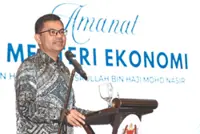JAKARTA: Multiple high-ranking government officials have raised serious concerns about the economic hardships to be faced in 2023, noting the necessity to mitigate such risks.
In a keynote address at the National Investment Meeting held on Wednesday, President Joko “Jokowi” Widodo explained that Indonesia and many other countries were facing economic woes that will be prolonged into 2023, and he expects a global recession to start “early next year”.





